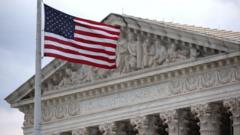The U.S. Supreme Court has reached a crucial impasse over the establishment of Oklahoma's first religious charter school, affirming a previous ruling by the Oklahoma State Supreme Court. This 4-4 tie on Thursday means that state funding for the proposed Catholic charter school, intended to receive approximately $23.3 million over five years, will not proceed.
After the Oklahoma school board’s approval in 2023, the proposed institution was met with considerable legal opposition. Oklahoma Attorney General Gentner Drummond filed a lawsuit to halt funding, citing constitutional concerns that public money should not support religious education, consistent with the First Amendment's prohibition against establishing a religion. In a statement following the Court's decision, Drummond called the ruling a "resounding victory for religious liberty," emphasizing that taxpayer funds should not be allocated to religious institutions, including potential future grants to Islamic schools, which he deemed "radical."
Conversely, the Archdiocese of Oklahoma has expressed disappointment over the Court's ruling, asserting that the denial of funding for its charter school constitutes religious discrimination. They argued for equal opportunities for all families in choosing educational institutions for their children. The St. Isidore of Seville Virtual Catholic Charter School planned to offer online education infused with religious teachings and aimed to serve around 500 students from kindergarten to high school.
While this case does not set a binding precedent, experts believe it opens the door for further challenges regarding the constitutionality of funding religiously affiliated educational institutions. Charter schools, which are publicly funded but privately managed, have seen increasing advocacy from conservatives, particularly those who view them as an avenue for educational choice and parental control. Republican Governor Kevin Stitt had previously endorsed the charter school, highlighting the political dimensions of the broader educational debate.
As legal opinions diverge on this sensitive issue of religious funding in education, the Supreme Court's decision leaves unanswered questions about the future role of religious organizations in publicly funded educational programs. The case exemplifies the ongoing struggle between assertions of religious freedom and the safeguarding of governmental neutrality in matters of faith.

















